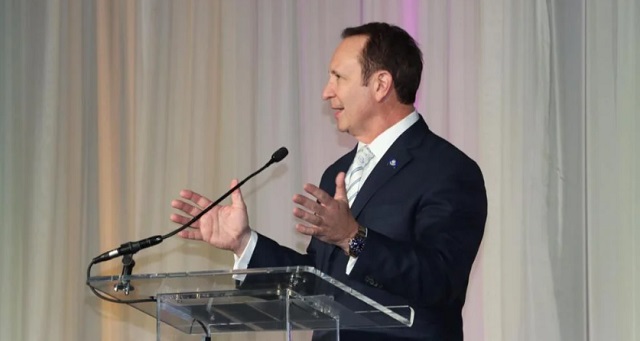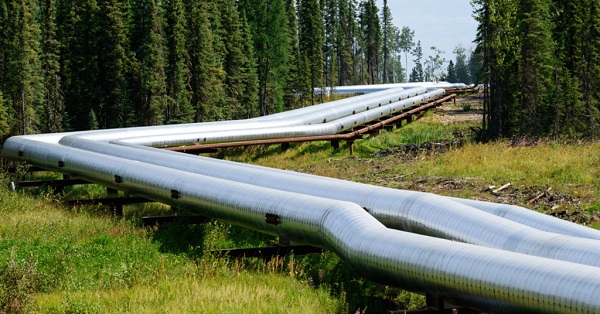Energy
GOP governors announce plan to ‘unleash American energy’

Louisiana Gov. Jeff Landry
From The Center Square
“The reason that inflation is out of control is because of the federal government. If the federal government took its foot off of the neck of American energy, we could absolutely lower the cost of everyday goods.”
Republican governors on Monday announced a plan to “unleash American energy.” They also called on President Joe Biden to protect U.S. energy security after they say his administration has taken more than 200 actions against the oil and natural gas industry.
The governors unveiled their plan in front of a the PBF Energy Chalmette Refinery on the banks of the Mississippi River in St. Bernard Parish, Louisiana, led by Louisiana Gov. Jeff Landry.
“American energy has done more than any other industry to lift more people out of poverty globally than any other industry that I’ve known of,” Landry said.
He said governors know the needs of Americans more than anyone else.
“What we hear from our constituents is that inflation is eating into the pockets of Americans. One of the greatest drivers of that inflation is energy,” Landry said. “The reason that inflation is out of control is because of the federal government. If the federal government took its foot off of the neck of American energy, we could absolutely lower the cost of everyday goods.”
The Louisiana governor listed actions the president took “attacking the industry” from his first day in office, including pausing new oil and gas leases, cancelling the Keystone XL pipeline, prioritizing foreign energy over domestic energy, and releasing agency “rules and regulations at a neck-breaking speed,” that hurt Americans’ pocket books and prioritize “government regulations over free market solutions.”
Joining Landry were governors Mike Dunleavy of Alaska, Brian Kemp of Georgia, Chris Sununu of New Hampshire, Doug Burgum of North Dakota, Kevin Stitt of Oklahoma, and Glenn Youngkin of Virginia.
“Americans are paying 40% more every time they fill up their gas tanks and Republican governors believe one of the best ways to help Americans with all these rising costs is to support an ‘all-of-the-above’ approach to American energy production,” Stitt said, similar to those being implemented in Republican-led states.
“Oklahoma has some of the most affordable reliable energy in the entire country,” he said, because of its “all-of-the-above approach.” Oklahoma is the 6th-largest producer of crude oil and natural gas, the third-largest producer of wind-generated electricity, has among the lowest electricity prices for commercial and industrial consumers, and reduced its electricity generation carbon intensity by 61% over the last two decades, he said.
Stitt cited examples of the president’s “regulatory war on American energy,” including another new EPA emission rule over which 25 attorneys general sued.
“When you’re a governor, you’re working for everybody,” Burgum said, including Republicans, independents and Democrats. “Right now, we’ve got so many Americans that are struggling to put gas in their tank and food on the table.” The governors are “fighting for every American who’s having to pay more than they should,” he said, because of Biden administration policies under the guise of “a big lie that says, ‘if we do all this it’s going to be good for the environment.’”
The U.S. is producing roughly 13 million barrels of oil a day but could be producing “15, 16, 18, 20 million barrels a day,” he said. “That would be not just energy independence, that would be energy dominance. We’d be selling that to our allies instead of our allies having to buy from our enemies,” which is what happened, he said.
The governors are part of a 21-governor coalition who called on the president to pursue “an all-of-the-above energy approach that will promote homegrown energy” instead of pursuing policies that benefit China.
Their solutions include ending regulatory overreach that restricts domestic energy production, including reversing policies on the Dakota Access and Keystone XL pipelines; increasing onshore and offshore lease sales for all forms of energy production, including in the National Petroleum Reserve in Alaska; expediting approval of federal drilling permits; removing the pause on LNG exports; reversing EPA rules; working with Congress to enact comprehensive permitting reform, among others.
Dan McTeague
Will this deal actually build a pipeline in Canada?

By Dan McTeague
Will Carney’s new pipeline deal actually help get a pipeline built in Canada? As we said before, the devil is in the details.
While the establishment and mainstream media cheer on the new pipeline agreement, there are specific details you need to be aware of.
Dan McTeague explains in his latest video.
Alberta
Premier Smith: Canadians support agreement between Alberta and Ottawa and the major economic opportunities it could unlock for the benefit of all

From Energy Now
By Premier Danielle Smith
Get the Latest Canadian Focused Energy News Delivered to You! It’s FREE: Quick Sign-Up Here
If Canada wants to lead global energy security efforts, build out sovereign AI infrastructure, increase funding to social programs and national defence and expand trade to new markets, we must unleash the full potential of our vast natural resources and embrace our role as a global energy superpower.
The Alberta-Ottawa Energy agreement is the first step in accomplishing all of these critical objectives.
Recent polling shows that a majority of Canadians are supportive of this agreement and the major economic opportunities it could unlock for the benefit of all Canadians.
As a nation we must embrace two important realities: First, global demand for oil is increasing and second, Canada needs to generate more revenue to address its fiscal challenges.
Nations around the world — including Korea, Japan, India, Taiwan and China in Asia as well as various European nations — continue to ask for Canadian energy. We are perfectly positioned to meet those needs and lead global energy security efforts.
Our heavy oil is not only abundant, it’s responsibly developed, geopolitically stable and backed by decades of proven supply.
If we want to pay down our debt, increase funding to social programs and meet our NATO defence spending commitments, then we need to generate more revenue. And the best way to do so is to leverage our vast natural resources.
At today’s prices, Alberta’s proven oil and gas reserves represent trillions in value.
It’s not just a number; it’s a generational opportunity for Alberta and Canada to secure prosperity and invest in the future of our communities. But to unlock the full potential of this resource, we need the infrastructure to match our ambition.
There is one nation-building project that stands above all others in its ability to deliver economic benefits to Canada — a new bitumen pipeline to Asian markets.
The energy agreement signed on Nov. 27 includes a clear path to the construction of a one-million-plus barrel-per-day bitumen pipeline, with Indigenous co-ownership, that can ensure our province and country are no longer dependent on just one customer to buy our most valuable resource.
Indigenous co-ownership also provide millions in revenue to communities along the route of the project to the northwest coast, contributing toward long-lasting prosperity for their people.
The agreement also recognizes that we can increase oil and gas production while reducing our emissions.
The removal of the oil and gas emissions cap will allow our energy producers to grow and thrive again and the suspension of the federal net-zero power regulations in Alberta will open to doors to major AI data-centre investment.
It also means that Alberta will be a world leader in the development and implementation of emissions-reduction infrastructure — particularly in carbon capture utilization and storage.
The agreement will see Alberta work together with our federal partners and the Pathways companies to commence and complete the world’s largest carbon capture, utilization and storage infrastructure project.
This would make Alberta heavy oil the lowest intensity barrel on the market and displace millions of barrels of heavier-emitting fuels around the globe.
We’re sending a clear message to investors across the world: Alberta and Canada are leaders, not just in oil and gas, but in the innovation and technologies that are cutting per barrel emissions even as we ramp up production.
Where we are going — and where we intend to go with more frequency — is east, west, north and south, across oceans and around the globe. We have the energy other countries need, and will continue to need, for decades to come.
However, this agreement is just the first step in this journey. There is much hard work ahead of us. Trust must be built and earned in this partnership as we move through the next steps of this process.
But it’s very encouraging that Prime Minister Mark Carney has made it clear he is willing to work with Alberta’s government to accomplish our shared goal of making Canada an energy superpower.
That is something we have not seen from a Canadian prime minister in more than a decade.
Together, in good faith, Alberta and Ottawa have taken the first step towards making Canada a global energy superpower for benefit of all Canadians.
Danielle Smith is the Premier of Alberta
-

 Business2 days ago
Business2 days agoWhy Does Canada “Lead” the World in Funding Racist Indoctrination?
-

 Business2 days ago
Business2 days agoLoblaws Owes Canadians Up to $500 Million in “Secret” Bread Cash
-

 Dan McTeague2 days ago
Dan McTeague2 days agoWill this deal actually build a pipeline in Canada?
-

 Media2 days ago
Media2 days agoThey know they are lying, we know they are lying and they know we know but the lies continue
-

 Censorship Industrial Complex1 day ago
Censorship Industrial Complex1 day agoUS Condemns EU Censorship Pressure, Defends X
-

 Economy10 hours ago
Economy10 hours agoAffordable housing out of reach everywhere in Canada
-

 Focal Points2 days ago
Focal Points2 days agoThe West Needs Bogeymen (Especially Russia)
-

 Banks2 days ago
Banks2 days agoTo increase competition in Canadian banking, mandate and mindset of bank regulators must change





